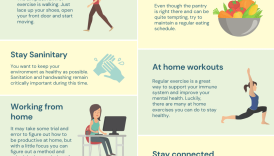The Science Behind Smart Choices for Healthy Living

Introduction to Healthy Living Choices
Importance of Making Smart Choices
Making smart choices is essential in leading a healthy lifestyle. Every decision, whether it relates to food, exercise, or mental well-being, shapes one’s overall health. The choices made today set the foundation for tomorrow’s wellness. Consider a simple example: opting for a home-cooked meal over fast food. Not only does cooking at home allow you to control ingredients, but it also fosters healthier eating habits in the long run. This one small decision can result in significant advantages, including improved mood and energy levels, and it reduces the risk of chronic illnesses such as obesity and diabetes. Here are a few tips to enhance your decision-making process toward healthier living:
- The Science Behind Smart Choices for Healthy Living
- Introduction to Healthy Living Choices
- Importance of Making Smart Choices
- Impact of Lifestyle on Health
- Nutrition and Healthy Eating Habits
- Balanced Diet and Nutrient Requirements
- Benefits of Meal Planning
- Physical Activity and Exercise
- Importance of Regular Exercise
- Types of Physical Activities
- Stress Management and Mental Well-being
- Understanding Stress and Its Effects
- Strategies for Mental Health
- Quality Sleep and Rest
- Importance of Sleep for Health
- Creating a Restful Environment
- Hydration and Its Benefits
- Importance of Staying Hydrated
- Hydration Tips for Healthy Living
- Prioritize whole foods: Incorporate more fruits, vegetables, whole grains, and lean proteins into your diet.
- Set realistic goals: Start with achievable goals to avoid feelings of frustration.
- Educate yourself: Understanding nutritional labels can significantly influence your food choices.
Impact of Lifestyle on Health
Lifestyle choices have a profound impact on health. A balanced lifestyle not only prolongs life but also improves the quality of life. For instance, engaging in regular physical activity can boost cardiovascular health, while inadequate sleep can lead to severe health complications like heart disease and depression. Key lifestyle factors that influence health include:
- Diet: Nutrient-rich foods enhance bodily functions and prevent diseases.
- Physical Activity: Regular exercise strengthens the heart and improves mental health.
- Stress Management: Healthy coping mechanisms can mitigate the effects of stress on the body.
In summary, making informed and smart choices when it comes to diet, exercise, and mental health significantly influences overall wellness and longevity. Understanding this empowers individuals to take charge of their health and make positive changes that last a lifetime.
Nutrition and Healthy Eating Habits
Balanced Diet and Nutrient Requirements
When it comes to healthy living, nutrition plays a pivotal role, and understanding the concept of a balanced diet is essential. A balanced diet provides the right proportions of carbohydrates, proteins, fats, vitamins, and minerals that our bodies need to function optimally. For instance, consider a typical plate that includes:
- Fruits and Vegetables: Aim for at least half your plate. They provide essential vitamins and fiber, which aid digestion.
- Whole Grains: Say hello to brown rice, quinoa, or whole-grain bread, as they help in maintaining energy levels.
- Proteins: Incorporate lean meats, fish, legumes, or nuts for muscle repair and growth.
These food groups not only support bodily functions but also help energize your day. When John, a busy professional, switched to a balanced diet loaded with whole foods, he noticed a significant boost in his energy levels and mood.
Benefits of Meal Planning
Meal planning is a game-changer for anyone striving to eat healthier. By taking a bit of time at the start of the week to plan meals, individuals can save themselves from the chaos of last-minute decisions that often result in unhealthy choices. Here are some benefits of meal planning:
- Saves Time: Grocery shopping becomes straightforward as you only buy what you need.
- Prevents Waste: Planning meals helps in utilizing ingredients fully, reducing food waste.
- Healthier Choices: With a plan, it’s easier to steer clear of temptations like takeout or junk food.
For example, after incorporating meal planning into her routine, Sarah found that she not only ate healthier but also saved money by avoiding impulse buys at the grocery store. In summary, by focusing on a balanced diet and embracing meal planning, individuals can significantly improve their nutrition, making it easier to stay on track with their healthy eating habits.
Physical Activity and Exercise
Importance of Regular Exercise
Transitioning from healthy eating to physical activity, exercise is another crucial pillar of a holistic approach to wellness. Regular exercise is not just about losing weight; it’s fundamental for maintaining overall health. Engaging in physical activity can improve cardiovascular health, strengthen muscles, and enhance mental well-being. Take the case of Mark, who incorporated a daily jogging routine into his life. Beyond shedding a few pounds, he found that regular exercise provided him with more energy throughout the day and sharper focus at work. This transformation speaks volumes about the positive effects of movement on both body and mind. The benefits of regular exercise include:
- Improved Mood: Physical activity stimulates the production of endorphins, often referred to as “feel-good” hormones.
- Enhanced Strength and Flexibility: Consistent workouts promote stronger muscles and better flexibility, reducing the risk of injuries.
- Better Sleep: Those who engage in regular physical activity often enjoy improved sleep quality.
Types of Physical Activities
Diverse types of physical activities can fit into any lifestyle, making it easier for anyone to find something they enjoy. Here are some popular options:
- Aerobic Exercises: Activities like running, cycling, and swimming are excellent for cardiovascular health.
- Strength Training: Lifting weights or using resistance bands helps build muscle mass and strength.
- Flexibility Exercises: Practices like yoga or Pilates improve overall flexibility and can ease tension.
Whether through structured workouts at the gym or casual walks in the park, there’s no shortage of ways to incorporate physical activity into daily life. Finding enjoyable forms of exercise is key—when you’re having fun, it doesn’t feel like work! In conclusion, regular exercise is essential for overall health and wellness. No matter the type, making physical activity a priority harmonizes beautifully with healthy eating habits, paving the way for a vibrant and energetic lifestyle.
Stress Management and Mental Well-being
Understanding Stress and Its Effects
As we delve deeper into the holistic approach to healthy living, it’s crucial to address stress management and mental well-being. Stress is often seen as a negative force, but it’s essential to understand that a certain amount of stress is natural and can even enhance performance. However, chronic stress can have debilitating effects on both mental and physical health. Take Lucy, who faced daily stress from a demanding job and juggling family responsibilities. Over time, she began experiencing fatigue, irritability, and even physical symptoms like headaches. These effects are common as stress can lead to increased blood pressure, weakened immune responses, and mental health issues like anxiety and depression. Key effects of prolonged stress include:
- Cognitive Challenges: Difficulty concentrating or making decisions.
- Emotional Influences: Increased feelings of anxiety, frustration, or helplessness.
- Physical Symptoms: Headaches, stomach issues, and disrupted sleep patterns.
When stress goes unmanaged, it can overshadow all aspects of life, making it challenging to maintain healthy habits.
Strategies for Mental Health
Fortunately, there are effective strategies to manage stress and nurture mental health. Here are some strategies that can help:
- Mindfulness and Meditation: Taking moments to practice mindfulness or meditate can effectively clear the mind and enhance emotional resilience.
- Physical Activity: As mentioned before, regular exercise can help alleviate stress by promoting the release of endorphins.
- Social Connections: Maintaining relationships with family and friends offers vital support and perspective during tough times.
For Brian, incorporating daily walks with a friend not only kept him physically fit but also provided a fantastic outlet for discussing challenges and relieving stress. By understanding stress and taking active steps to manage it, individuals can pave the way to better mental well-being. In the grand scheme of healthy living, addressing mental health is just as significant as nutrition and exercise, creating a balanced and fulfilling life.
Quality Sleep and Rest
Importance of Sleep for Health
Continuing from the discussion on mental well-being, quality sleep and adequate rest are fundamental components of a healthy lifestyle. Many people underestimate the power of sleep, but its importance cannot be overstated. Sleep is essential for various bodily functions, including the repair of tissues, regulation of hormones, and cognitive processes. For instance, Emily, a university student, noticed that her productivity plummeted when she skimped on sleep during exam periods. After a few nights of good rest, her focus sharpened, and she felt significantly more energized. Sleep, indeed, works wonders for overall health, with some key benefits including:
- Improved Memory: Sleep aids in memory consolidation, helping the brain process and store information.
- Enhanced Mood: A good night’s sleep can lead to better emotional regulation, reducing irritability and anxiety.
- Physical Recovery: During deep sleep, the body undergoes essential repair processes, like muscle recovery and immune system strengthening.
Creating a Restful Environment
To maximize the benefits of sleep, individuals need to cultivate a restful environment. Small changes in one’s surroundings can make a significant difference. Here are some strategies:
- Keep It Dark: Use blackout curtains or an eye mask to block out disruptive light.
- Control Temperature: A cooler room temperature promotes better sleep. Aim for around 60–67°F (15–19°C).
- Minimize Noise: Utilize earplugs or a white noise machine to drown out disruptive sounds.
When Alex transformed his bedroom to create a calming oasis—incorporating soft lighting, comfortable bedding, and eliminating screen time before bed—he was amazed at how quickly his sleep quality improved. In summary, prioritizing quality sleep and making adjustments to create a restful environment are crucial steps toward better health. Just as nutrition and exercise play vital roles, cultivating proper sleep habits completes the wellness puzzle, enabling individuals to thrive in all aspects of life.
Hydration and Its Benefits
Importance of Staying Hydrated
As we wrap up our exploration of essential components of healthy living, we can’t overlook the critical role of hydration. Staying hydrated is fundamental for maintaining health and supporting bodily functions. Water plays a key role in regulating body temperature, aiding digestion, and flushing out toxins. Consider Lisa, who often found herself feeling sluggish in the afternoons. After she began prioritizing hydration—making sure to drink ample water throughout the day—she experienced a noticeable increase in energy and focus. Adequate hydration is vital for several reasons:
- Optimal Bodily Functions: Water is crucial for nutrient transportation and chemical reactions that occur in the body.
- Skin Health: Proper hydration can lead to better skin elasticity and appearance, minimizing dryness and flakiness.
- Cognitive Performance: Even mild dehydration can impair cognitive functions such as attention and memory.
Hydration Tips for Healthy Living
To reap the benefits of proper hydration, individuals can adopt some simple strategies. Here are some actionable tips:
- Carry a Water Bottle: Having a reusable water bottle on hand serves as a constant reminder to drink water throughout the day.
- Set Reminders: Use your phone or a hydration app to send alerts reminding you to take a sip regularly.
- Flavor It Up: If plain water seems dull, infuse it with fruits like lemon, berries, or mint for a refreshing twist.
For example, David started infusing his water with slices of cucumber and mint, finding it not only delightful but also a motivating way to stay hydrated. In conclusion, hydration is an essential aspect of healthy living that directly impacts energy levels, physical performance, and overall health. By understanding the importance of staying hydrated and employing practical tips, individuals can enhance their well-being and enjoy a more vibrant life.





